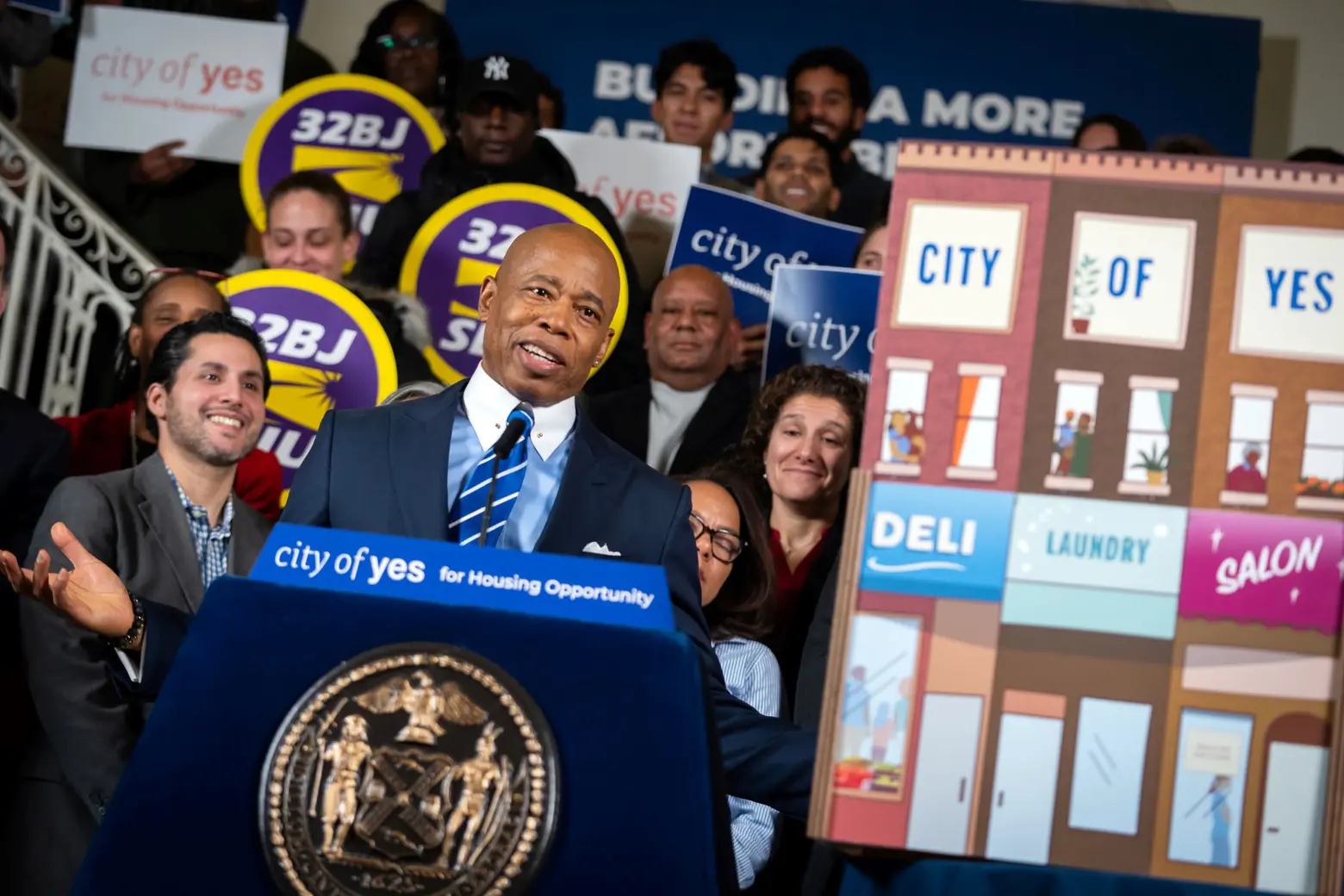NYC Council passes ‘City of Yes,’ paving the way for 82K new homes

Credit: Ed Reed/Mayoral Photography Office on Flickr
The City Council on Thursday voted 31-20 to approve Mayor Eric Adams’ landmark “City of Yes” housing proposal, marking a major step forward in addressing New York City’s critical housing shortage. The final version of the plan largely resembles the mayor’s original vision but includes amendments by the Council that lower the projected number of new homes from 109,000 to roughly 82,000 over the next 15 years. The plan also includes significant investments in affordable housing, homeownership, tenant protections, and sewer, street, and open space infrastructure development across the five boroughs.
City of Yes is the most comprehensive housing proposal in NYC’s history, with citywide zoning reforms projected to produce more housing than any initiatives led during Bill de Blasio’s eight-year administration or Michael Bloomberg’s 12-year administration.
Mayor Adams has committed $1 billion to housing developments, $2 billion to infrastructure projects like sewers, flood prevention, street improvements, and open spaces, and $1 billion in expense funding over the next decade for tenant protections. Gov. Kathy Hochul has pledged $1 billion in state funding for housing capital over the next five years.
The plan passed by a narrow majority, underscoring the contentious debate surrounding the proposal that has consumed City Hall for months. Many councilmembers who opposed the plan, especially those representing Queens and Staten Island neighborhoods with primarily single-family homes, said their constituents feared the zoning reforms would alter their neighborhoods’ character.
Council Speaker Adrienne Adams, in supporting the plan, urged her colleagues to look beyond their individual districts and do what is best for the entire city.
“By taking a major step to address the housing shortage, while supporting existing homeowners and tenants, making housing more affordable, expanding homeownership opportunities, and strengthening the infrastructure of neighborhoods, we are advancing a safer and stronger city,” Speaker Adams said.
“This shows that our city can ensure every area helps contribute to confronting the housing crisis by creating more housing, while respecting the differences of neighborhoods across the five boroughs and investing in New Yorkers.”
Meanwhile, Mayor Adams celebrated the victory, marking a potential high point for his administration, which has faced mounting controversy following record-low approval ratings and a federal corruption indictment in September.
“Today is a historic day in New York City, but, more importantly, for working-class New Yorkers. We showed the nation that government can still be bold and brave by passing the most pro-housing piece of legislation in city history,” the mayor said. “Our administration proposed and fought hard for this proposal for more than year, and now New Yorkers are the ones who will benefit from lower rent.”
On November 22, the proposal received key approval from the Council after securing $5 billion in funding and incorporating several changes to the original plan.
Other key elements, including the acceleration of office-to-residential conversions and a density bonus for affordable housing, were untouched following the Council’s vote.
One modification to the plan replaces the citywide elimination of parking mandates in new developments with a three-zone system that will either eliminate, scale back, or maintain parking requirements based on the development’s location.
In Zone 1, which includes most of Manhattan and parts of western Brooklyn and Queens, parking mandates will be eliminated. In Zone 2, spanning areas of central Queens, the Bronx, and Brooklyn, parking mandates will be scaled back. Finally, in Zone 3, the parking mandates will remain unchanged.
The original proposal to eliminate the parking mandate citywide was rejected, despite concerns from developers who argued that the cost of adding parking—much of which requires underground garages—makes projects financially unfeasible and often results in higher rent prices.
Another modification mandates that large developments in the Universal Affordability Preference (UAP) program reserve 20 percent of their affordable units for households earning 40 percent or less of the area median income (AMI), ensuring deeply affordable housing for individuals with incomes below $44,000 and families of four earning less than $62,000.
On November 4, the City Council introduced ‘City for All,’ a housing plan designed as a counterproposal to Adams’ ‘City of Yes.’ The plan included several measures and funding demands to guarantee affordability for renters and homeowners.
In September, the CPC voted 10 to 3 to approve “City of Yes,” clearing the first hurdle of the approval process.
RELATED:
Get Inspired by NYC.
Leave a reply
Your email address will not be published.





























lets see if the city of yes will address the much needed TRULY AFFORDABLE housing, they also need to take a serious look at these high rents for the AMI, end NYC segregated housing policy, speed up the approval so these buildings can get built, people need housing asap, and finally its pass time for these warehouse apartments to get renovated and rented out asap for truly affordable housing
[…] the borough to unlock potential housing sites for development, using the tools included in the recently passed “City of Yes for Housing Opportunity.” Dubbed the “Manhattan Plan,” the new initiative […]